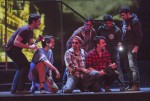This week, 18th-century playboy Don Giovanni returns to the UCLA stage donning a black-and-white suit and fedora.
On Feb. 14, Opera UCLA premiered a contemporary production of Mozart’s classic two-act opera “Don Giovanni.” A winner of the Luciano Pavarotti International Voice Competition, guest director Jeffrey Buchman’s production is showing again at UCLA’s Freud Playhouse this Friday and Sunday.
Though Opera UCLA has produced “Don Giovanni” in the past, the Department of Music’s opera division has formed a contemporary, updated version of the performance. This production ofMozart’s 226-year-old operahas been visually modernized with red Solo cup- and polo shirt-equipped choristers, nightclub dancersandcellphones.
The cast is comprised of opera students in the UCLA Division of Voice and Opera, with alumna Liana Dillaway as stage manager. Costumes, lighting, projections and set design come from students in the School of Theater, Film and Television. Opera UCLA performs the production with UCLA Philharmonia, UCLA’s prime orchestra, in the opera’s original Italian language.
First performed in 1787, “Don Giovanni” is a blend of opera seria (heavy drama) and opera buffa (comedy). ” The adaptation tells the story of the titular jetsetting, wealthy playboy Don Giovanni, who succeeds in avoiding punishment for his actions because ofhis staggering wealth and powerful friends.
“‘Don Giovanni’ is a conventional story we see all the time,” said Peter Kazaras, director of opera studies. “It’s a guy who’s a real bad boy and who women say they hate, but they still go back to him.”
To form an aesthetically pleasing performance, the stage is lit up in a riot of colors. Students in the Department of Theater collaborated with Opera UCLA to form computer-simulated backdrops and projections of objects ranging from candelabras to simulated fireworks.
Buchman said the adaptation is set in modern-day Monte Carlo, because it is known as an exciting city defined by luxury.
“The city allows us to paint Don Giovanni as a bored womanizer who can have whatever he wants and who searches for stimulation constantly,” he said. “It turns out to be a wonderful playground for him to have his descent.”
Most of the casting took place at the beginning of the school year. Four operatic coaches have worked on the performers’ pronunciation of Italian words, their understanding of the text and their grasp of their respective characters.
Kazaras, who is serving as a producer for the show, said he is pleased with the selections. In terms of style, Kazaras said although the opera calls for darkness, the performers deliver with comedy.
“We have to make sure we’re heavy in the drama and really dedicated to feeling the heaviness of it while keeping the lightness of the humor that rides the wave above it. These two elements happening together, I think, are the hardest challenge of ‘Don Giovanni,'” Buchman said.
A former opera singer himself, Kazaras said he attributes the show’s success to its young cast.
“Working with young artists is a whole different toolbox. They are not as experienced as older singers, therefore they are more willing to try things out,” Kazaras said.
In addition to a willing cast, the production is made possible by orchestral students in UCLA Philharmonia and their conductor, Neal Stulberg, director of orchestral studies. The orchestra has worked with Opera UCLA on “Don Giovanni” since January.
“It’s always a great experience for UCLA students to learn about opera and to learn the very special techniques it takes as an orchestra to perform in the pit,” Stulberg said.
Kazaras said he also looks at the production as a way for students to learn something new. The producer said he hopes not just to surprise the audience, but also to electrify it.
“You will hear singing that is unamplified,” Kazaras said. “Unamplified human singing that is astonishing.”
